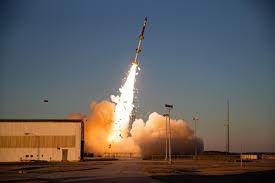Aerojet Rocketdyne Develops and Successfully Tests New Solid Rocket Motor for Kratos’ Zeus Program
Aerojet Rocketdyne has successfully developed, and static-fire tested the Zeus 1, an advanced stage 1 Large Solid Rocket Motor (LSRM) for Kratos. The motor met or exceeded performance expectations.
“Congratulations to the Aerojet Rocketdyne and Kratos teams for this outstanding achievement,” said Eileen P. Drake, Aerojet Rocketdyne CEO and president. “This test validated the robustness of our innovative motor design for an affordable hypersonic application and further demonstrated our large solid rocket motor capabilities at Camden, where we support multiple industry customers to power various defense programs.”
The motor was developed by Aerojet Rocketdyne at its Huntsville, Alabama facilities and manufactured and tested in Camden, Arkansas. The motor’s development was co-funded by Kratos and Aerojet Rocketdyne.
Eric DeMarco, President and CEO of Kratos Defense & Security Solutions, said, “The Zeus 1 accomplishment is a representative example of the force multiplier effect and success of the Kratos and Aerojet Rocketdyne relationship, which is a true partnership. Aerojet Rocketdyne is a clear technological leader in the rapid development and production of cost-effective propulsion systems like Zeus, and top-down, Aerojet Rocketdyne is focused on the mission’s success.”
Kratos intends to use the Zeus 1 commercial solid rocket motor to support launch vehicle stages for its research, hypersonic and ballistic missile target vehicles. The Company noted in an announcement that the Zeus 1 motor performance “provides substantial improvement” over similar legacy solid rocket motors, and they expect the advancements to provide Kratos’ customers opportunities to “fly more often, faster and farther using fewer stages at a substantially reduced cost.”
The Zeus 1 is the first of two high-performance LSRMs developed by Aerojet Rocketdyne under the Kratos Zeus Program. Aerojet Rocketdyne is now manufacturing the larger Zeus 2 motor, slated for testing at its Camden facility later this year.

